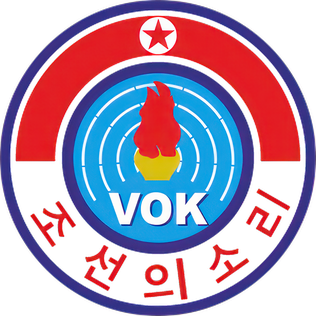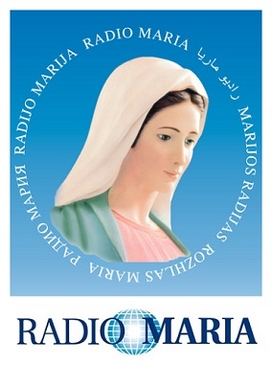
Shortwave radio is radio transmission using radio frequencies in the shortwave bands (SW). There is no official definition of the band range, but it always includes all of the high frequency band (HF), which extends from 3 to 30 MHz. It lies between the medium frequency band (MF) and the bottom of the VHF band.
International broadcasting consists of radio and television transmissions that purposefully cross international boundaries, often with then intent of allowing expatriates to remain in touch with their countries of origin as well as educate, inform, and influence residents of foreign countries. Content can range from overt propaganda and counterpropaganda to cultural content to news reports that reflect the point of view and concerns of the originating country or that seek to provide alternative information to that otherwise available as well as promote tourism and trade. In the first half of the twentieth century, international broadcasting was used by colonial empires as a means of connecting colonies with the metropole. When operated by governments or entities close to a government, international broadcasting can be a form of soft power. Less frequently, international broadcasting has been undertaken for commercial purposes by private broadcasters.
The Canadian Radio Broadcasting Commission, also referred to as the Canadian Radio Commission (CRC), was Canada's first public broadcaster and the immediate precursor to the Canadian Broadcasting Corporation.
Radio Canada International (RCI) is the international broadcasting service of the Canadian Broadcasting Corporation (CBC). Prior to 1970, RCI was known as the CBC International Service. The broadcasting service was also previously referred to as the Voice of Canada, broadcasting on shortwave from powerful transmitters in Sackville, New Brunswick. "In its heyday", said Radio World magazine, "Radio Canada International was one of the world's most listened-to international shortwave broadcasters". However, as the result of an 80 percent budget cut, shortwave services were terminated in June 2012, and RCI became accessible exclusively via the Internet. It also reduced its services to five languages and ended production of its own news service.

Radio Havana Cuba is the official government-run international broadcasting station of Cuba. It can be heard in many parts of the world, including the United States, on shortwave frequencies. Radio Havana Cuba, along with Radio Rebelde, Cubavision Television, and other Cuban radio and television, broadcasts to North, Central and South America via free-to-air programming from the Hispasat 30W-6 satellite over the Atlantic Ocean and worldwide via Internet streaming.

Radio Moscow, also known as Radio Moscow World Service, was the official international broadcasting station of the Union of Soviet Socialist Republics until 1993, when it was reorganized into Voice of Russia, which was subsequently reorganized and renamed into Radio Sputnik in 2014. At its peak, Radio Moscow broadcast in over 70 languages using transmitters in the Soviet Union, Eastern Europe, and Cuba.

Shortwave listening, or SWLing, is the hobby of listening to shortwave radio broadcasts located on frequencies between 1700 kHz and 30 MHz (30 000 kHz). Listeners range from casual users seeking international news and entertainment programming, to hobbyists immersed in the technical aspects of long-distance radio reception and sending and collecting official confirmations that document their reception of remote broadcasts (DXing). In some developing countries, shortwave listening enables remote communities to obtain regional programming traditionally provided by local medium wave AM broadcasters. In 2002, the number of households that were capable of shortwave listening was estimated to be in the hundreds of millions.
Shortwave broadcasting in the United States allows private ownership of commercial and non-commercial shortwave stations that are not relays of existing AM/MW or FM radio stations, as are common in Africa, Europe, Asia, Oceania except Australia and Latin America. In addition to private broadcasters, the United States also has government broadcasters and relay stations for international public broadcasters. Most privately owned shortwave stations have been religious broadcasters, either wholly owned and programmed by Roman Catholic and evangelical Protestant charities or offering brokered programming consisting primarily of religious broadcasters. To better reach other continents of the world, several stations are located in far-flung US territories. Shortwave stations in the US are not permitted to operate exclusively for a domestic audience; they are subject to antenna and power requirements to reach an international audience.
HCJB, "The Voice of the Andes", was the first radio station with daily programming in Ecuador and the first Christian missionary radio station in the world. The station was founded in 1931 by Clarence W. Jones, Reuben Larson, and D. Stuart Clark. HCJB now focuses on Ecuador with unified programming on FM at 89.3 MHz in Pichincha, at 92.5 MHz in Manabí, at 96.1 MHz in Tungurahua and Cotopaxi, at 98.3 MHz in Esmeraldas and with separate programming on AM at 690 kHz. Broadcasts in Spanish and indigenous languages on 6.05 MHz (1 kW), continue on an intermittent basis with a new solid state transmitter which in 2017 replaced an older (5 kW) transmitter. These broadcasts were not listed on the HCJB English website as of February 2016.
The Bible Broadcasting Network (BBN) is a listener-supported global Conservative Christian radio network staffed and headquartered in Charlotte, North Carolina. It was founded in 1971 by Lowell Davey, who was the network's president until his death in 2017. It remains under family control, with Davey's daughter Barbara Redemann and her husband Carl Redemann leading BBN.

Voice of Korea is the international broadcasting service of North Korea. It broadcasts primarily information in Chinese, Spanish, German, English, French, Russian, Japanese and Arabic. Until 2002 it was known as Radio Pyongyang. The interval signal is identical to that of Korean Central Television.
Radio Sweden is Sweden's official international broadcasting station. It is a non-commercial and politically independent public service broadcasting company.

Radio Maria, formally known as The World Family of Radio Maria, is an international Catholic radio broadcasting service founded in Erba, province of Como, in the diocese of Milan, Italy, in 1987.
United Nations Radio was created on 13 February 1946. In 2017, United Nations Radio and the UN News Centre merged to form UN News, producing daily news and multimedia content in Arabic, Chinese, English, French, Swahili, Portuguese, Russian, Spanish, and Hindi. In its new iteration, UN News Audio continues to produce daily news and feature stories about the work of the UN and its member countries in eight languages for more than 2,000 partner radio stations around the world.

KNLS is an international shortwave radio station near Anchor Point, Alaska, United States. The station is operated by World Christian Broadcasting, a non-profit company based in the United States. KNLS broadcasts 20 hours a day of Christian-themed programming in Chinese, English and Russian.
RRI Voice of Indonesia, abbreviated as VOI, is an Indonesian international broadcaster under Radio Republik Indonesia (RRI), an Indonesian public radio network. Founded in 1945, it is the oldest Indonesian international media organization. It broadcasts via shortwave radio as well as streaming television and provides information about Indonesia to people around the world.
WTWW is a shortwave station located in Lebanon, Tennessee. It is officially licensed to Leap of Faith, Inc. As of December 2022, WTWW has one working transmitter, that on 5.085 MHz, which operates during the evening hours carrying Scriptures for America, a service produced by LaPorte Church of Christ.
Family Broadcasting Corporation, formerly known as LeSEA Broadcasting, is an American Christian television network. Founded by Lester Sumrall in 1972, Family Broadcasting Corporation is headquartered in South Bend, Indiana, and broadcasts Christian and family programming. Peter Sumrall, son of Lester Sumrall, served as its president and chief executive officer from 2002 to 2015. His son, Drew Sumrall, now serves in the same position.
Madagascar World Voice is a shortwave radio station located in Mahajanga. The station began transmissions in 2016 and is operated by World Christian Broadcasting as a sister station of KNLS in Alaska, USA.






